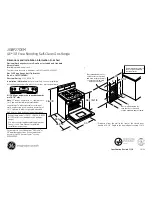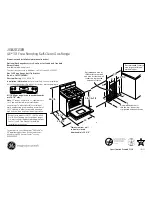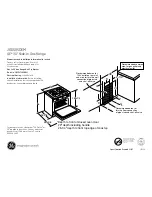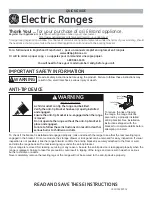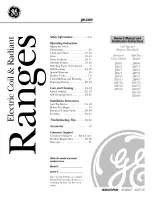
31
Griddle/Simmer Plate
1. After using the griddle, always remove the drip pan located below it
by pulling the drip pan toward you. The drip pan needs to be
cleaned after each use of the griddle. Cooked-off grease will drain
from the griddle through the drain tube and accumulate in the drip
pan. Wash in hot soapy water or with an antibacterial cleaner. The
drip pan needs to be cleaned after each use. If grease is permitted
to accumulate, fire hazard could occur, since the griddle burners are
directly above the pan.
2. Rub the surface of a hot griddle with unsalted solid shortening,
vegetable oil or spray it with a non-stick cooking spray. Thoroughly
wipe it with a burlap or another rough cloth to remove food
particles and other residue.
3. Stubborn spots may be removed by rubbing the surface with a
rough grained nylon scrubbing pad with cooking oil. If necessary,
flush the surface of a warm griddle (200°F/93°C) with club soda and
wipe over entire surface with a paper towel. Coat lightly with
cooking oil.
4. Special griddle cleaners are commercially available which may be
used to remove heavy soil build-up. Follow manufacturer’s directions
exactly. Rinse the griddle with room temperature club soda after
using these cleaners. Dry and coat lightly with cooking oil. Use
griddle stones only when absolutely necessary and then with
extreme caution. Wipe away any griddle-stone dust and food
particles and coat lightly with cooking oil.
5. Using hot soapy water to clean the griddle will remove the cooked-
in seasoning and will require re-seasoning by coating lightly with
cooking oil.
6.
Never flood a hot griddle with cold water!
This promotes griddle
warping and can cause the griddle plate to crack if continued over a
period of time.
30
If ports on the burners are clogged, clean with a straight pin. Do not
enlarge or distort the ports. Do not use a toothpick to clean the ports.
When replacing burner caps, carefully align the tabs underneath the cap
with the outside edge of burner. Make sure burner cap is level.
Occasionally check the burner for proper size and shape. If flames lift off
ports, are yellow, or are noisy when turned on, you may need to clean
the burners or call a qualified technician for adjustment.
Sealed Surface Burners (If applicable)
Wipe up spill-overs as soon as possible after they occur and before
they get a chance to burn in and cook solid. In the event of a spill-
over, follow these steps:
1. Allow the burner and grate to cool to a safe temperature level.
2. Lift off the burner grates.
3. Remove the burner cap and clean per instructions below.
4. Wipe up any spills which remains on the sealed top surface.
5. Wash the grates and burner caps in hot, soapy water and rinse
clean.
6. Replace burner cap and grate after drying thoroughly.
If ports on the burners are clogged, clean with a straight pin. Do not
enlarge or disort the ports. Do not use a toothpick to clean the ports.
Make sure burner cap is level. Occasionally check the burner for
proper size and shape. If flames lift off ports, are yellow, or are noisy
when turned on, you may need to clean the burners or call a qualified
technician for adjustments.
Burner Caps
The surface burner caps should be routinely removed and cleaned.
Always clean the burner caps after a spill over. Keeping the burner caps
clean will prevent improper ignition and uneven flames. To clean, pull
burner cap straight up from the burner base. Wipe off surface burner
caps with warm, soapy water and a soft cloth after each use. Use a a
non-abrasive cleanser such as Bon Ami
TM
and a soft brush or soft Scotch
Brite
TM
pad for cooked-on foods. Dry thoroughly after cleaning. For best
cleaning and to avoid possible rusting, do not clean in dishwasher or
self-cleaning oven. When replacing burner caps, carefully align the tabs
underneath the cap with the outside edge of burner. Make sure burner
cap is level.
Sealed Burner Aluminum Base (If applicable)
The aluminum base should be wiped regularly with hot soapy water at
the end of each cooling period.
Do not use
steel wool, abrasive cloths,
cleanser, or powders. To remove encrusted materials, soak the area with
at hot towel to loosen the material, then use a wooden or nylon spatula.
Do not use
a metal knife, spatula, or any other material tool to scrape the
aluminum base.
NOTE:
For stubborn stains, use non-abrasive cleanser
such as Bon Ami
TM
and a soft brush or soft Scoth Brite
TM
pad.
Control Panel
DO NOT USE any cleaners containing ammonia or abrasives. They could
remove the graphics from the control panel. Use hot, soapy water and a
soft clean cloth.
Control Knobs
MAKE SURE THE CONTROL KNOBS POINT TO THE OFF POSITION
BEFORE REMOVING. Pull the knobs straight off. Wash in detergent and
warm water. Do not soak knobs. Dry completely and replace by pushing
firmly onto stem. DO NOT USE any cleaners containing ammonia or
abrasives. They could remove the graphics from the knob.
Содержание F1220L
Страница 20: ...38 39...




















